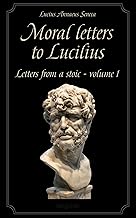
How to Read Seneca's Books on Wisdom
How to Read Seneca's Books on Wisdom
Estimated Reading Time: 10-12 minutes
Introduction
Lucius Annaeus Seneca, commonly known as Seneca the Younger, was a Roman Stoic philosopher, statesman, and playwright whose works have left a lasting mark on Western thought. Born around 4 BCE in Corduba (modern-day Córdoba, Spain), Seneca lived during a tumultuous period of Roman history, marked by political intrigue and moral decay. His philosophy, particularly as expressed in his "Letters to Lucilius," offers profound insights into the nature of wisdom, ethics, and the human condition.
Seneca's unique perspective on wisdom is deeply rooted in Stoic philosophy, which emphasizes rationality, self-control, and the importance of virtue. Unlike many of his contemporaries, Seneca’s approach is both practical and accessible, making his teachings relevant even today. His letters, addressed to his friend Lucilius, serve as a guide to living a virtuous life amidst the challenges of existence, encouraging readers to reflect on their own lives and choices.
Why Seneca's Perspective Matters
Seneca's approach to wisdom is distinctive for several reasons. First, he emphasizes the importance of personal reflection and self-examination as pathways to understanding oneself and the world. His insights are not merely theoretical; they are grounded in his own experiences, including his political struggles and personal hardships. This blend of philosophy and lived experience gives his work a unique authenticity.
Moreover, Seneca diverges from other philosophical traditions by advocating for a practical application of wisdom in everyday life. While Plato and Aristotle focused on abstract ideals, Seneca’s letters offer concrete advice on how to navigate the complexities of human emotions, relationships, and societal pressures. His thoughts on anger, grief, and the fleeting nature of life resonate deeply with modern readers, making his work timeless.
Seneca's influence extends beyond his own era, shaping the thoughts of later philosophers, writers, and even psychologists. His exploration of the human psyche and ethical living continues to inspire those seeking personal growth and self-improvement.
Overview of Recommended Books
Letters to Lucilius
"Letters to Lucilius," a collection of 124 letters written by Seneca to his friend Lucilius, serves as a cornerstone of Stoic literature. Each letter addresses various aspects of life, philosophy, and wisdom, making it an invaluable resource for anyone seeking to cultivate a deeper understanding of themselves and the world around them.
Main Themes and Arguments
The letters cover a wide range of topics, including the nature of happiness, the inevitability of death, the importance of friendship, and the practice of virtue. Seneca’s primary argument is that true wisdom lies in living in accordance with nature and reason, and that one must cultivate inner peace through self-discipline and reflection.
Historical Context and Significance
Written during a time of political upheaval and personal turmoil, Seneca’s letters reflect the struggles of a man caught between his philosophical ideals and the realities of life in Rome. His correspondence with Lucilius not only serves as a personal dialogue but also as a broader commentary on the moral challenges of society.
Key Insights and Takeaways
-
The Importance of Self-Reflection: Seneca emphasizes the need for regular introspection, urging readers to examine their thoughts and actions critically. This practice leads to greater self-awareness and personal growth.
-
Embracing Mortality: One of Seneca’s most profound insights is the acceptance of death as a natural part of life. By contemplating mortality, individuals can prioritize what truly matters and live more fully.
-
The Value of Friendship: Seneca highlights the significance of genuine friendships in cultivating wisdom and virtue. He argues that true friends challenge us to grow and reflect on our moral character.
-
The Power of Reason: Throughout the letters, Seneca advocates for the use of reason as a guiding principle in decision-making. By aligning our actions with rational thought, we can achieve a more harmonious existence.
Why Read This Book:
"Letters to Lucilius" is essential reading for anyone interested in the theme of wisdom. Its unique contribution lies in its practical approach to Stoic philosophy, making complex ideas accessible and applicable to everyday life. Students, professionals, and anyone seeking personal growth will find value in Seneca's insights.
Key Themes and Sections
Seneca's letters can be divided into several key themes that collectively address the concept of wisdom:
-
Practical Ethics: Many letters focus on ethical living, emphasizing the importance of virtue and moral integrity. Seneca encourages readers to act in accordance with their values, regardless of external circumstances.
-
Emotional Resilience: Seneca explores the nature of emotions, particularly anger and grief, offering strategies for managing them effectively. His insights into emotional resilience are particularly relevant in today’s fast-paced world.
-
Philosophy as a Way of Life: Seneca argues that philosophy should not be an abstract pursuit but a practical guide for living. He emphasizes the importance of integrating philosophical principles into daily life.
-
The Role of Nature: A recurring theme is the alignment of one’s life with the natural order. Seneca believes that understanding and accepting the natural world leads to greater wisdom and tranquility.
Throughout "Letters to Lucilius," Seneca’s ideas build upon one another, creating a comprehensive understanding of wisdom that is both profound and practical.
Who Would Benefit from Reading These Books
"Letters to Lucilius" is suitable for a diverse audience:
- Students and Academics: Those studying philosophy or literature will find rich material for analysis and discussion.
- General Readers Interested in Wisdom: Anyone seeking to enhance their understanding of life’s challenges will benefit from Seneca’s insights.
- Professionals Seeking Practical Wisdom: Individuals in high-pressure environments can apply Seneca’s teachings to cultivate resilience and ethical decision-making.
- Anyone Looking for Personal Growth: Readers on a journey of self-improvement will find actionable advice that resonates with their experiences.
Recommended Reading Order
To maximize your understanding of Seneca's work, consider the following reading strategy:
- Begin with: The introductory letters (1-5) - These letters set the stage for Seneca’s philosophy and introduce key concepts.
- Focus on: Letters addressing specific themes, such as Letter 24 (on anger) and Letter 70 (on the value of friendship) - These letters provide practical insights that can be immediately applied.
- Advanced study: Engage with the later letters (100-124) - These letters delve deeper into complex ideas and offer a more mature reflection on wisdom.
As you read, take notes and reflect on how Seneca’s insights apply to your own life.
Conclusion
Seneca's contributions to the theme of wisdom through "Letters to Lucilius" offer timeless lessons that resonate across the ages. His blend of practical advice and philosophical depth encourages readers to reflect on their lives, cultivate virtue, and embrace the challenges of existence with grace.
As you explore Seneca's work, consider how his insights can inform your own journey toward wisdom. Whether you are a newcomer to philosophy or a seasoned thinker, Seneca’s letters provide a rich tapestry of ideas that inspire personal growth and ethical living. Embrace the wisdom of Seneca, and allow it to guide you in your quest for a more meaningful life.
Featured Books

Letters to Lucilius
by Seneca
Published: 65
The Moral Letters of Lucilius (in Latin, Ad Lucilium Epistulae Morales), is the collection of letters that the Roman Stoic philosopher Seneca (4 BC - 65 AD) sent to his friend, the Procurator of Sicily Lucilius Junior.The letters often begin with a comment about daily life, followed by an abstracted topic or concept based on that comment. The end output resembles a philosophical notebook. Many typical Stoic topics are addressed in the letters, including death's disdain, the sage's steadfastness, and virtue as the highest good.This series was made by the great Latinist Richard Mott Gummere between 1917 and 1925, containing:Volume I (1917): Letters 1 to 65;Volume II (1920): Letters 66 to 92;Volume III (1925): Letters 93 to 124.This is the first volume of the series made in 1917.